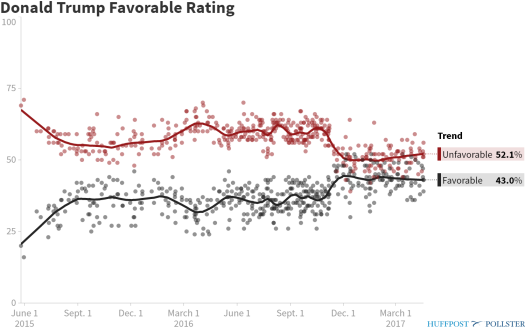Is Congress about to shut down the Federal government on Friday?

Federal funding expires Friday, April 28th at midnight. We’ve been in this situation almost every time since the 2013 shutdown, and even years before that. For the previous eight years, blame has been on Obama. According to some House and Senate Republicans, they stopped submitting any appropriation funding requests and arguing if they can’t get their voice heard, they wouldn’t participate at all. Many claimed to be waiting for a Republican Administration to rejoin the funding fights.
So, for at least the last 4 (but more like 6 to 8) years, Congress has been passing Continuing Resolutions (CRs) which fund the government “at current levels” that is really at about a 2011 funding levels. But this time, with a Republican controlled House, Senate, and Oval Office, the party of fiscal responsibility should lead us out of the Shutdown crisis era, giving us robust budgets with increase military spending and elimination unnecessary domestic programs. Right? Surely someone has been working on this?
Across the US, federal employees have been dusting off their shutdown procedure manuals – sending emails, reminders, and FQA’s about pay, hours, and more. Confidence among Agencies is thin at best. Members of Congress gave the shutdown a “fifty-fifty chance”, and even the President admitted he “didn’t know yet” if a budget has to include his border funding. With 5 working days left to go, hundreds of Congressional staffers cancelling weekend plans – I’ve outlined the 3 possible situations we will find ourselves in by Friday.
Option one, and most unlikely: A new budget passes.
With Congress back in Session on Monday, a full legislative week is plenty of time to develop a new spending bill, but it would be difficult to draft legislation that appeases the Freedom Caucus Members, border state Republicans, and Moderate Democrats – and of course Trump himself.
Let’s break it down in numbers: With 5 current House vacancies, Republicans need 215 votes to pass anything out of the House. At 237 Republican Members, it’s not a slam dunk it appears to be. The House Freedom Caucus, which keeps it membership secret, is estimated to have anywhere between 30 and 40 members. Typically these Members have voted to cut government spending, opposing social domestic programs. In this CR, funding for welfare, Affordable Care Act, Planned Parenthood – essentially all Obama era funding levels. Of the 237 Republicans, passing these funding levels is likely to result in at least 23 Freedom Caucus members who vote no, fearing a yes vote makes them appear more liberal and weaker than their constituency will tolerate. Out of the Top 40 most conservative Members in the House, I will wager all who vote yes will have a primary challenger announce within 60 days.
The Second groups of concern are border-state Republicans who are, for the most part, against any increased funding for building a wall. A budget that appeases President Trump’s campaign promise to build a way is likely to lose a handful of Republicans in southern states – but almost guaranteed to lose the votes of moderate Republicans, aka the Tuesday Group (like Charlie Dent, Elise Stefanki, other Northeastern Republicans) whose states and even districts voted for Hillary in the 2016 Presidential. Not only would a vote to pass a budget that includes border funding be a political nightmare for their press teams, it is easy for these Republicans to stick to their guns of fiscal responsibility and vote against this measure.
Moderate Democrats are in an equally difficult situation – but if House Republicans have anything to teach their minority counterparts – it’s a lot easier to message a NO vote when your party doesn’t control the White House. Moderate Democrats only account for maybe 10 to 20 members, but when pass/fail margins will be this slim – pulling a Moderate Dem might prove easier than a Freedom Caucus Republican. Of course, Democrats will want to see funding for social programs and are likely to oppose a wall as well.
The Senate is less mysterious, needing 51 votes to pass, and it’s Members operate with more transparency. We can expect some Democratic procedural posturing on anything that come sup, but with Democratic Senators Joe Manchin and Heidi Heitkamp who face uphill 2018 elections, the bill likely faces an easier fight in the Upper Chamber, though squeak by with only one or two votes.
Option two, most likely: A short-term CR passes
This option doesn’t resolve the conflicts listed above, but it does make things more interesting. Pushing a CR by a week or two would signal House Leadership will eventually bring up a new funding bill … or it could signal House Leadership is stalling for time. A short term CR meets the definition of compromise – that no one will be completely happy with it. This option rocks the boat the least but would have the longest reaching ramifications on elections. A CR that extends much longer than two weeks could rightly be considered a failure of Republican House and Senate Leadership. While we can appreciate the time consuming effort it took from Paul Ryan to save Trump from an embarrassing defeat on the Health Care vote, many will be less sympathetic towards their Republican leaders for failing to get a new budget up and running.
This sort of political quagmire is what took John Boehner down and out – he put up a compromise budget at the death to his own political career avoiding an otherwise inevitable shutdown. It seems unlikely that new-ish Speaker Ryan and his leadership would be willing to fall on this sword. Additionally, it’s always been difficult to gather what the public opinion is on CRs as it’s a wonky policy move that has no visible impact on the day-to-day life of an average citizen. But it has far reaching implications to our military – and to campaign donors and campaign opponents. A CR doesn’t make anyone happy.

Stalling for time, in and of itself, doesn’t resolve any of the conflicts listed above. But politics is a shifting winds games, and it’s a tried and true strategy to try to wait out a bad vote. Waiting a week can often radically differ the outcome and perspective, allowing enough time for visits from the White House and Administration officials. More importantly, Republicans haven’t been ahead of this crisis – so a week or two stall gives Republicans the needed print and air time to message this effectively. Of course, it gives Democrats another week to punch a whole in their boat too.
My money is on a short term CR simply because it’s the path of least resistance for Republican Leadership right now. If you’ve heard your Members of Congress complain about the establishment – this is the textbook example. A new budgeting bill would be far better for keeping Republicans elected – but it’s proven too sticky for leadership to accomplish – and thus, forces a no win situation onto their Members. Politics!
Option three, wild card: A short-term CR passes both chambers, but is veto’d by the President.
It’s hard to say how likely this option is, but for now it’s as likely as any of the others. Senate and House Republicans, with the help of a few Moderate Democrats, could pass a slightly increased budget that avoids funding the wall and other controversial measures, and place it on the President’s desk with less than 24 hours to go before a shutdown is triggered. If that happens, watch for the House and Senate to adjourn and members to rush back home to their districts, leaving a giant turd in President Trump’s lap. It would force Trump to either single handedly shut the government down and call back all 535 Members of Congress, or he will forced to sign a budget that is lacking a vast majority of his campaign promises, and his 100 day mark comes to pass with honestly no major accomplishment to speak of. To the President’s record – he’s eaten more campaign promises before his 100 day mark than just about any other president without too much ill effect (besides declining poll numbers). Would the wall be any different to his base, if he would kick that can down the road with Health Care? Probably not.

But more importantly that Congress pulling the rug out from President Trump’s campaign platform is the fact this bill would erode the fear of Trump on Capitol Hill. A veto by the President, if he gets a bill without his priorities, would be most Trump-esq to reject outright a proposal he doesn’t like – consequences be damned. If anything else, I believe that’s a large reason why Trump’s base still supports him and expect from him. Trump’s largest asset in Congress is the fact he’s been immune the battles he has already lost – but he hasn’t been sololy responsible. That is, up until now. If a bill makes it to his desk before 11:59 Friday, Trump holds the ultimate responsibly.
Congress will be quick to learn if they can wrestle Trump under their control by using deadlines and forcing him uncomfortable political positions to get what they want. I’d bet Steven Bannon would encourage Trump to veto a bill he doesn’t like – as Bannon understands well the importance of keeping an element of fear among the rank and file. A veto causes major headaches and complaints from Members, but it would keep them afraid and in line, and Trump as powerful as ever. If Bannon still holds the President’s ear, which many have argued his is losing influence, we will know by the week’s end. Should this situation arise, it will at least give us an indication if there is anything left of the Art of Deal.

Update: We are now about 30 hours away from a shutdown. If you view http://repcloakroom.house.gov/ you’ll see that Government funding is not presently on the vote list, but listed under “possible consideration”. Friday is the likely day we can expect to see this.
Additionally, I’m hearing a one week CR – pushing the shutdown date to May 5th. One week doesn’t really change much and again has long term ramifications, especially on Military spending, but changes very little about the political landscape. Let’s wait to see what happens tomorrow, and watch to see how op eds and Press Shows start the Republican and Democratic spin to win.

